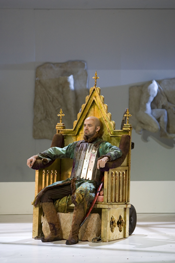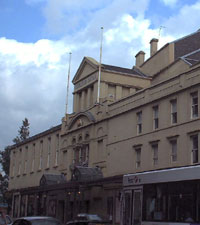
15 Nov 2006
Handel Unwrapped by Scottish Opera: “Tamerlano” at tea-time
On a cold, wet and dark Glasgow evening in November, some 500 brave souls received what was possibly their first taste of baroque opera.
English Touring Opera are delighted to announce a season of lyric monodramas to tour nationally from October to December. The season features music for solo singer and piano by Argento, Britten, Tippett and Shostakovich with a bold and inventive approach to making opera during social distancing.
This tenth of ten Live from London concerts was in fact a recorded live performance from California. It was no less enjoyable for that, and it was also uplifting to learn that this wasn’t in fact the ‘last’ LfL event that we will be able to enjoy, courtesy of VOCES8 and their fellow vocal ensembles (more below …).
Ever since Wigmore Hall announced their superb series of autumn concerts, all streamed live and available free of charge, I’d been looking forward to this song recital by Ian Bostridge and Imogen Cooper.
Although Stile Antico’s programme article for their Live from London recital introduced their selection from the many treasures of the English Renaissance in the context of the theological debates and upheavals of the Tudor and Elizabethan years, their performance was more evocative of private chamber music than of public liturgy.
Evidently, face masks don’t stifle appreciative “Bravo!”s. And, reducing audience numbers doesn’t lower the volume of such acclamations. For, the audience at Wigmore Hall gave soprano Elizabeth Llewellyn and pianist Simon Lepper a greatly deserved warm reception and hearty response following this lunchtime recital of late-Romantic song.
For this week’s Live from London vocal recital we moved from the home of VOCES8, St Anne and St Agnes in the City of London, to Kings Place, where The Sixteen - who have been associate artists at the venue for some time - presented a programme of music and words bound together by the theme of ‘reflection’.
'Such is your divine Disposation that both you excellently understand, and royally entertaine the Exercise of Musicke.’
‘And there was war in heaven: Michael and his angels fought against the dragon; and the dragon fought and his angels, And prevailed not; neither was their place found any more in heaven … that old serpent … Satan, which deceiveth the whole world: he was cast out into the earth, and his angels were cast out with him.’
There was never any doubt that the fifth of the twelve Met Stars Live in Concert broadcasts was going to be a palpably intense and vivid event, as well as a musically stunning and theatrically enervating experience.
‘Love’ was the theme for this Live from London performance by Apollo5. Given the complexity and diversity of that human emotion, and Apollo5’s reputation for versatility and diverse repertoire, ranging from Renaissance choral music to jazz, from contemporary classical works to popular song, it was no surprise that their programme spanned 500 years and several musical styles.
The Academy of St Martin in the Fields have titled their autumn series of eight concerts - which are taking place at 5pm and 7.30pm on two Saturdays each month at their home venue in Trafalgar Square, and being filmed for streaming the following Thursday - ‘re:connect’.
The London Symphony Orchestra opened their Autumn 2020 season with a homage to Oliver Knussen, who died at the age of 66 in July 2018. The programme traced a national musical lineage through the twentieth century, from Britten to Knussen, on to Mark-Anthony Turnage, and entwining the LSO and Rattle too.
With the Live from London digital vocal festival entering the second half of the series, the festival’s host, VOCES8, returned to their home at St Annes and St Agnes in the City of London to present a sequence of ‘Choral Dances’ - vocal music inspired by dance, embracing diverse genres from the Renaissance madrigal to swing jazz.
Just a few unison string wriggles from the opening of Mozart’s overture to Le nozze di Figaro are enough to make any opera-lover perch on the edge of their seat, in excited anticipation of the drama in music to come, so there could be no other curtain-raiser for this Gala Concert at the Royal Opera House, the latest instalment from ‘their House’ to ‘our houses’.
"Before the ending of the day, creator of all things, we pray that, with your accustomed mercy, you may watch over us."
The doors at The Metropolitan Opera will not open to live audiences until 2021 at the earliest, and the likelihood of normal operatic life resuming in cities around the world looks but a distant dream at present. But, while we may not be invited from our homes into the opera house for some time yet, with its free daily screenings of past productions and its pay-per-view Met Stars Live in Concert series, the Met continues to bring opera into our homes.
Music-making at this year’s Grange Festival Opera may have fallen silent in June and July, but the country house and extensive grounds of The Grange provided an ideal setting for a weekend of twelve specially conceived ‘promenade’ performances encompassing music and dance.
There’s a “slide of harmony” and “all the bones leave your body at that moment and you collapse to the floor, it’s so extraordinary.”
“Music for a while, shall all your cares beguile.”
The hum of bees rising from myriad scented blooms; gentle strains of birdsong; the cheerful chatter of picnickers beside a still lake; decorous thwacks of leather on willow; song and music floating through the warm evening air.

On a cold, wet and dark Glasgow evening in November, some 500 brave souls received what was possibly their first taste of baroque opera.
The occasion was a special pre-performance event designed to offer local people the chance to get an insight into the operas that the Company are currently showing, and in this case it was Handel’s great drama “Tamerlano” written in that miraculous period of his life, 1723-25 when he also produced “Giulio Cesare” and “Rodelinda”. They call the series “Opera Unwrapped” and judging from the example last week, it is a resounding success.
The format is simple: the audience are invited to attend, for free, for an hour in the early evening prior to a performance that they may, or may not, be attending. All are welcome - on this occasion there were school children of about 8 or 9, and all ages above - and the musicians are members of the regular orchestra and the singers are the understudies, or covers for the first cast. What is essential is an excellent communicator as host to guide proceedings and explain what is being seen, and Scottish Opera certainly had that in Mark Hathaway, staff producer and assistant to the opera’s director John la Bouchardiere. He had the sort of engaging charm and self-deprecating wit that everyone responded to immediately - no High Artiness here.
In an hour, young and old in the audience were given a quick but informed resume of the baroque opera form, Handel and his times, the castrati and today’s countertenor voice, the de capo aria and - to the delight of the kids - how to replicate an angry tyrant spraying a room with machine-pistol bullets. That went down particularly well and judging by their faces in a box above me, it was a real “shock and awe” success. On the subject of the countertenor voice, our host invited second-cast Robert Ogden to demonstrate the entire range of his voice, from the top of his falsetto to the bottom of his root baritone voice - again this drew appreciative applause and much comment. It also presumably cleared up any lingering misconceptions about the singer’s masculinity that might have remained in the minds of those not yet familiar with the voice-type. Some more insights into high-level work in the set and safety lines - demonstrated by a brave soprano - concluded the entertainment, and entertaining it certainly was, judging by the buzz of fascinated and positive reactions all around the auditorium.
 Many opera houses already have outreach programmes, and pre-performance talks, but this most open and democratic of formats which encourages people to just pop into the theatre after work, or school, seems to work particularly well as a blue-print for extending and deepening the company’s relationship with its local population.
Many opera houses already have outreach programmes, and pre-performance talks, but this most open and democratic of formats which encourages people to just pop into the theatre after work, or school, seems to work particularly well as a blue-print for extending and deepening the company’s relationship with its local population.
Anyone who saw the little nine year old girl leaning over the balcony and studiously mimicking the conductor as he guided the orchestra through a lively ritornello, or watched the twelve year old boy riveted by Tamerlano’s furious outbursts and gun-toting in Act Three, could only assume that they, at the very least, went home wanting to come again one day to the magical world of opera. Let us hope that Scottish Opera will still be there for them.
Sue Loder